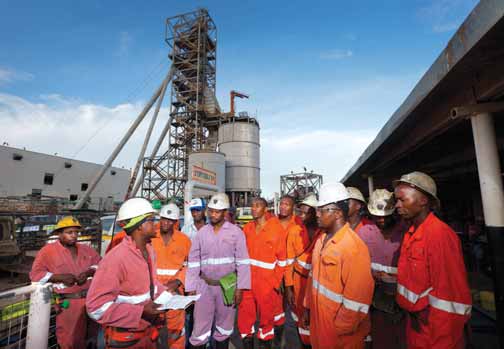Figures published in 2017 indicate ACACIA Mining employs around 3000 workers in their three gold mines–excluding indirect employees linked through local product supply chains at the three mines.

By TZ Business News Staff.
Barrick Gold Corporation and ACACIA Mining have described their employees in Tanzania as very supportive during a period of hardship in the country.
The appreciation is contained in a joint statement released July 19, 2019 meant to announce an agreement had been reached for Barrick Gold to buy out ACACIA’s minority shares at the behest of the Tanzania Government which has ordered ACACIA out of the country due to business misconduct.
“ACACIA employees in Tanzania provided exceptional and unstinting support in continuing operations in country” between 2017 and this year, the joint statement says in part.
In March of 2017, the Tanzania Government banned all ACACIA export of metallic mineral concentrates, complaining the gold miner had been under declaring exports and had evaded taxes to the tune of nearly USD 190 billion.
One of Acacia’s employees was later charged by the Tanzanian Prevention and Combating of Corruption Bureau (PCCB) with an offence under the Tanzanian Prevention and Combating of Corruption Act.
The PCCB also charged two current and one former Acacia employee, together with Bulyanhulu Gold Mine Limited and Pangea Minerals Limited and North Mara Gold Mine Limited and a third party Canadian entity, Explorations Miniers du Nord Ltd – the third party company being the former joint venture partner for the Tulawaka mine which was closed after its mine line ended. Charges included a number of offences including breaches of the Tanzania Anti-Money Laundering Act. A total of 39 charges were brought.
The Tanzania Government said it had made a firm decision ACACIA would not be allowed to continue operating in the country due to the various acts of business misconduct but would allow Barrick Gold the majority share holder owning 63.9% of shares to continue operating the mines, which include Buzwagi and Bulyanhulu gold mine in Shinyanga region and North Mara Gold Mine in Mara region.
The dispute threatened gold production levels, the company’s cash flow and the very survival of the company in Tanzania, according to the joint statement. But the mining company has made remarkable achievements under these stressful circumstances through resilience and commitment of the ACACIA workforce in the country.
Figures published in 2017 indicate ACACIA employs around 3000 workers in its three gold mines.

On February 11, 2019 ACACIA’s Interim CEO Peter Geleta said in statement he was “pleased to report that during 2018 we successfully stabilized the business with our focus on operational performance across all three mines”.
“We achieved gold production of 521,980 ounces for the year, substantially ahead of our initial 2018 production guidance of 435,000 to 475,000 ounces, and we maintained a strong cost discipline achieving an all-in sustaining cost of US$905 per ounce sold, well below the full year guidance range of US$935 to US$985 per ounce.
“This would not have been possible without the sheer resilience, hard work and determination of all of our people and I would like to thank each and every one of them for their contributions to the Acacia Group, particularly given the continued challenging operating environment this year,” Geleta said back then.
In the wake of the mineral concentrates ban the gold miners realized the Government actions carried with it potential to negatively affect sustainability of the business and present risks to employees and other stakeholders—risks which would include the danger of losing some of the company’s best employees according to the joint statement.
ACACIA placed Bulyanhulu Gold Mine on reduced operations in the second half of 2017 then announced plans to lay-off 1,200 employees from the mine and another 100 employees from Buzwagi gold mine. But this plan was modified to involve only the only the security personel.

Barrick Gold and ACACIA have in the meantime announced they have reached an agreement the former is buying out ACACIA to appease the Tanzania government. After a long standoff, Barrick Gold and Acacia Mining have reached an agreement in which Barrick Gold will buyout the minority shareholders in Acacia Mining as reported by MarketRealist who have also based their report on the joint statement. Barrick already owns 63.9% of the existing ordinary share capital of Acacia.
The acquisition will be implemented by a court-sanctioned scheme. Under this scheme, each scheme shareholder will receive 0.168 new Barrick shares and any Acacia exploration properties’ special dividends for each scheme share. Previously, Barrick offered an exchange ratio of 0.153 on its shares. Based on Barrick’s current share price, Acacia is valued at approximately $951 million. Thus, the current offer represents a premium of 24.2% to Acacia’s closing stock price on July 18.
Notably, Barrick launched the offer to acquire the remaining stake in Acacia in a bid to resolve Acacia’s issues with the Tanzanian government. These ongoing disputes have adversely impacted Acacia’s business for over two years now. The Tanzanian government banned mineral concentrate exports from the countryin March 2017. It did so because it believed it wasn’t getting a fair share of profits from mining in the country. As a result of this ban, Acacia had to put its Bulyanhulu mine on reduced operations.
There are also other issues between the government of Tanzania and Acacia. These issues include disputes about tax, environmental, and criminal matters. Recently, the Tanzania government ordered Acacia to stop using the tailings storage facility at its North Mara mine. This mine makes up close to 70% of Acacia’s revenues, so a long outage would impact the company significantly.
Barrick mentioned in the press release that “This position is not sustainable and the liquidity of the Company will be constrained in the absence of a resolution.” Barrick added, “the only way forward to preserve, to the extent possible, the value of Acacia’s assets was for Barrick to make an offer to acquire all of the Acacia Shares not already owned by it.” Therefore, a resolution of these issues with the Tanzania government would reduce a huge overhang on Barrick’s shares. So the resolution could help investors to focus more on its value proposition, which is growing profitable production at lower costs and increasing shareholder value.



